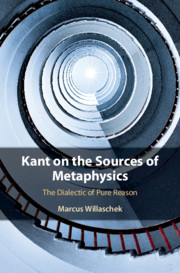Book contents
- Kant on the Sources of Metaphysics
- Kant on the Sources of Metaphysics
- Copyright page
- Dedication
- Contents
- Note on References and Citations
- Preface
- Introduction
- Part I From Reason to Metaphysics
- Introduction to Part I
- 1 Kant’s Conceptions of Reason and Metaphysics
- 2 The Logical Use of Reason and the Logical Maxim
- 3 The Supreme Principle of Pure Reason
- 4 Understanding the Transition Passage (A307–8/B364)
- 5 The Transition from the Logical Maxim to the Supreme Principle of Pure Reason
- Conclusion to Part I: The Transition from the Logical Maxim to the (Constitutive) Supreme Principle and the Rational Sources Account
- Part II The Other Side of the Transcendental Dialectic
- Postscript
- Bibliography
- Index of Names
- Index of Subjects
2 - The Logical Use of Reason and the Logical Maxim
from Part I - From Reason to Metaphysics
Published online by Cambridge University Press: 09 November 2018
- Kant on the Sources of Metaphysics
- Kant on the Sources of Metaphysics
- Copyright page
- Dedication
- Contents
- Note on References and Citations
- Preface
- Introduction
- Part I From Reason to Metaphysics
- Introduction to Part I
- 1 Kant’s Conceptions of Reason and Metaphysics
- 2 The Logical Use of Reason and the Logical Maxim
- 3 The Supreme Principle of Pure Reason
- 4 Understanding the Transition Passage (A307–8/B364)
- 5 The Transition from the Logical Maxim to the Supreme Principle of Pure Reason
- Conclusion to Part I: The Transition from the Logical Maxim to the (Constitutive) Supreme Principle and the Rational Sources Account
- Part II The Other Side of the Transcendental Dialectic
- Postscript
- Bibliography
- Index of Names
- Index of Subjects
Summary
Chapter 2 discusses Kant’s account of the ‘logical use of reason,’ which consists in drawing ‘mediate inferences’ (e.g., syllogisms). It is guided by the ‘Logical Maxim,’ which requires us to search for the conditions of or conditioned cognitions until we arrive at unconditioned cognitions. Its aim is to transform our manifold cognitions about nature (both empirical and a priori) into a complete system of scientific knowledge and thus to achieve the ‘unity of reason.’ The chapter also places Kant’s conception of systematic cognition in the context of the Wolffian school and explains what it means for cognitions to be conditioned or unconditioned. Finally, the Logical Maxim is defended as a plausible expression of our rational striving for systematicity and completeness of knowledge.
Keywords
- Type
- Chapter
- Information
- Kant on the Sources of MetaphysicsThe Dialectic of Pure Reason, pp. 46 - 70Publisher: Cambridge University PressPrint publication year: 2018

